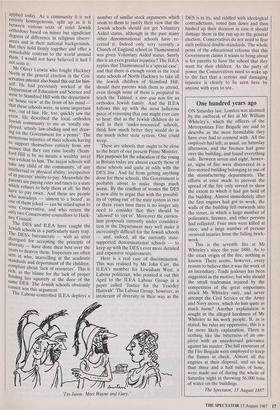One hundred years ago
ON Saturday last, London was alarmed by the outbreak of fire at Mr William Whiteley's, which the officers of the Metropolitan Fire Brigade are said to describe as the most formidable they have ever had to contend with. All the employes had left, as usual, on Saturday afternoon, and the firemen had gone over the building, and found everything safe. Between seven and eight, howev- er, signs of fire were discovered in a five-storied building belonging to one of the manufacturing departments. The efforts at once made to prevent the spread of the fire only served to show the extent to which it had got hold of the building. Almost immediately after the first engines had got to work, the walls of the building fell outwards into the street, in which a large number of policemen, firemen, and other persons had collected. Four men were killed at once, and a large number of persons received injuries from the falling brick- work.
This is the seventh fire at Mr Whiteley's since the year 1880. As to the exact origin of the fire, nothing is known. There seems, however, every reason to believe that it was the work of an incendiary. Trade jealousy has been suggested as the motive; but why should the small tradesman injured by the competition of the great emporiums attack Mr Whiteley only, and never attempt the Civil Service or the Army and Navy stores, which do him quite as much harm? Another explanation is sought in the alleged harshness of Mr Whiteley to his work people. If, as is stated, his rules are oppressive, this is a far more likely explanation. There is nothing like the bitterness of an em- ploye with an unredressed grievance against his master. The full resources of the Fire Brigade were employed to keep the flames in check. Almost all the engines at their disposal, and no less than three and a half miles of hose, were made use of during the whole of Saturday night in throwing 56,000 tons of water on the buildings.
The Spectator, 13 August 1887


















































 Previous page
Previous page